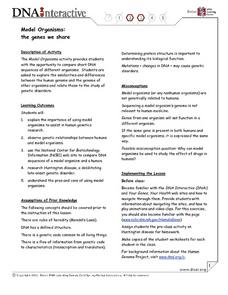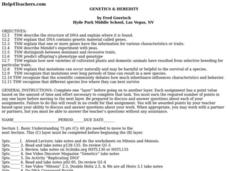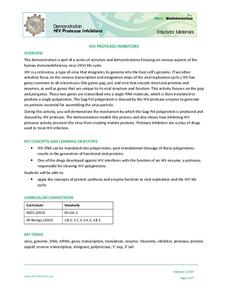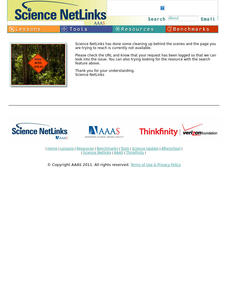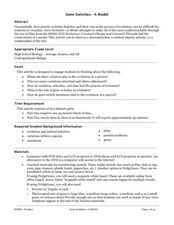Curated OER
Human Genetics-- Finding Our Genes
In this science worksheet, students study the relationships between cells, DNA, chromosomes, bases and genes. Students cut apart 6 cards and paste them onto another paper in order from largest objects to smallest objects. Prior knowledge...
Curated OER
Model Organisms: The Genes We Share
Middle schoolers gather information about gene banks. In this biology activity, students work in groups to complete an activity sheet about genetic databases and organism genomes. Lesson includes extension ideas.
Curated OER
How To Use Hardy-Weinberg to Find Gene Frequencies in s Wild Population
Students explore the gene frequency in Hardy-Weinberg Equilibrium experiments. They inquire into the studies of both black and gray squirrels. Basically the population genetics of certain squirrel populations. The species of each are...
Curated OER
DNA and Genes
Learners analyze the structure of DNA. They describe how the structure of DNA enables it to reproduce itself accurately. Students discuss genes and the sequence of nucleotides occur in DNA.
Curated OER
Genetics and Heredity
Students study genetics and heredity. They explore the structure of DNA and genes through a series of activities that includes watching videos, conducting online research, and making vocabulary books. They investigate DNA, genetics,...
Curated OER
Incomplete dominance, Codominance, Multiple Alleles
Students explore the principles of incomplete dominance and codominance in genes. They apply genetic previously discussed genetic principles to determine solutions to inheritance problems including multiple alleles, incomplete dominance...
Howard Hughes Medical Institute
HIV Protease Inhibitors
How do doctors fight a virus that's constantly mutating? Show science scholars how we fight HIV using one of its own most fundamental processes through a thoughtful demonstration. The lesson focuses on how protease inhibitors prevent HIV...
Serendip
Cell Differentiation and Epigenetics
Pregnant women exposed to PAH air pollution increase the risk of obesity in their children. The example of epigenetics, along with others, builds the basis for understanding the process of cell differentiation. Scholars view a video,...
Curated OER
Genes within Populations
Finally, here is a genetics worksheet that does not include Punnett squares! Designed for a more advanced class, biology learners will compare Lamarck's concept of evolution with Darwin's. They will explore the Hardy-Weinberg equilibrium...
Howard Hughes Medical Institute
Biochemistry and Cell Signaling Pathway of the Mc1r Gene
How do mice have so much fur color variation over generations? Scholars illustrate protein structures based on amino acid sequences. Then, they analyze the signaling pathway in different-colored mice populations. This allows them to...
Curated OER
Human Genetics
In this science worksheet, learners read about how many genes are present in tomatoes, fruit flies, humans, worms, and honey bees.
Curated OER
Gene Puzzles
Students explain that in sexually reproducing organisms, such as humans, typically half of the genes come from each parent. They examine a fictional pedigree and determine which gene is responsible for a given trait.
Curated OER
Mutations and Gene Regulation
Teenaged scientists can use this quiz or study guide to show off their understanding of genetic mutations and their causes; includes short answer, multiple choice, matching, and more.
Curated OER
Follow a Fish
Students choose a fish from anywhere within the Ocean Center. They observe it for a given time, recording its behavior. Students comprehend the concept that living things have individual characteristics that enable them to live in their...
Curated OER
Background of Diseases-- Germs or Genes?
Young scholars explore the background of common diseases. In this personal health lesson, students research causative agents of communicable and non-communicable diseases. Young scholars use their research findings to create data tables...
Curated OER
Dragon Genetics ~ Independent Assortment and Genetic Linkage
Imagine a pair of dragons that produce offspring. What percentage of the hatchlings have wings and large antlers? An engaging activity draws genetics learners in, introduces them to alleles, meiosis, phenotypes, genotypes, and...
Curated OER
Producing a Strain of E. coli that Glows in the Dark
Students observe the experimental process called bacterial transformation and demonstrate phenotype changes in bacteria that have been transformed with an antibiotic-resistance gene and a metabolic marker. They create a luminescent...
Curated OER
Dragon Genetics - Understanding Inheritance
Six pages begin with a detailed introduction to meiosis and homologous chromosome pairs. Instructions guide learners through a simulation in which they draw craft sticks marked with autosomes in order to decode the genes inherited by...
Howard Hughes Medical Institute
Microarrays and Stem Cells
Background reading is available in the first two pages of this worksheet, along with reading comprehension questions and a laboratory activity in which students use mircroarray technology to identify genes used in cell differentiation....
North Carolina State University
Exploring Genetics Across the Middle School Science and Math Curricula
Where is a geneticist's favorite place to swim? A gene pool. Young geneticists complete hands-on activities, experiments, and real-world problem solving throughout the unit. With extra focus on dominant and recessive genes, Punnett...
Curated OER
It's in the Genes!
Help your students discover more about themselves with these great lesson ideas involving heredity, genetics, and Punnett Squares.
Curated OER
Gene Switches- A Model
High schoolers explore genetic variation within a population. In this genetic adaptation lesson, students investigate the reasons contributing to genetic adaptation. High schoolers collaborate and analyze DNA models. Multiple resources...
Curated OER
Trichinella Forensics
Learners engage in DNA manipulation using forensics techniques. Students investigate topics involved in forensics studies such as cloning, electrophoresis, gene mapping, replication, and transcription.
Serendip
From Gene to Protein - Transcription and Translation
Learners identify the different steps involved in DNA transcription. In this genetics lesson, pupils complete a worksheet and model the translation process with a paper chain activity. They watch a video on sickle cell anemia and explain...
Other popular searches
- Dominant Genes
- Dominant and Recessive Genes
- Recessive Genes
- Genes and Heredity
- Chromosomes and Genes
- Genesis
- Dna, Genes & Chromosomes
- Dominate and Recessive Genes
- Traits and Genes
- Ethnicity Genes
- Color Genes
- Genes Alleles



